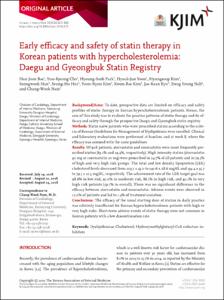KUMEL Repository
1. Journal Papers (연구논문)
1. School of Medicine (의과대학)
Dept. of Internal Medicine (내과학)
Early efficacy and safety of statin therapy in Korean patients with hypercholesterolemia: Daegu and Gyeongbuk Statin Registry
- Keimyung Author(s)
- Kim, Kwon Bae; Kim, Yoon Nyun; Cho, Yun Kyeong; Park, Hyoung Seob; Yoon, Hyuck Jun; Kim, Hyung Seop; Han, Seong Wook; Hur, Seung Ho
- Department
- Dept. of Internal Medicine (내과학)
- Journal Title
- The Korean Journal of Internal Medicine
- Issued Date
- 2020
- Volume
- 35
- Issue
- 2
- Abstract
- Background/Aims:
To date, prospective data are limited on efficacy and safety profiles of statin therapy in Korean hypercholesterolemic patients. Hence, the aim of this study was to evaluate the practice patterns of statin therapy and its efficacy and safety through the prospective Daegu and Gyeongbuk statin registry.
Methods:
Statin naïve patients who were prescribed statins according to the criteria of Korean Guidelines for Management of Dyslipidemia were enrolled. Clinical and laboratory evaluations were performed at baseline and at week 8, where the efficacy was assessed with the same guidelines.
Results:
Of 908 patients, atorvastatin and rosuvastatin were most frequently prescribed statins (63.1% and 29.3%, respectively). High intensity statins (atorvastatin 40 mg or rosuvastatin 20 mg) were prescribed in 24.7% of all patients and in 79.5% of high and very high risk groups. The total and low density lipoprotein (LDL) cholesterol levels decreased from 203.7 ± 43.0 to 140.6 ± 28.6 mg/dL and 134.4 ± 35.7 to 79.5 ± 21.3 mg/dL, respectively. The achievement rate of the LDL target goal was 98.6% in low risk, 95.0% in moderate risk, 88.1% in high risk, and 42.1% in very high risk patients (59.7% in overall). There was no significant difference in the efficacy between atorvastatin and rosuvastatin. Adverse events were observed in 12.0% of patients and led to 1.4% of treatment cessation.
Conclusions:
The efficacy of the usual starting dose of statins in daily practice was relatively insufficient for Korean hypercholesterolemic patients with high or very high risks. Short-term adverse events of statin therapy were not common in Korean patients with a low discontinuation rate.
- Alternative Title
- Early efficacy and safety of statin therapy in Korean patients with hypercholesterolemia: Daegu and Gyeongbuk Statin Registry
- Publisher
- School of Medicine (의과대학)
- Citation
- Hyoung-Seob Park et al. (2020). Early efficacy and safety of statin therapy in Korean patients with hypercholesterolemia: Daegu and Gyeongbuk Statin Registry. The Korean Journal of Internal Medicine, 35(2), 342–350. doi: 10.3904/kjim.2018.272
- Type
- Article
- ISSN
- 2005-6648
- Source
- http://kjim.org/journal/view.php?doi=10.3904/kjim.2018.272
- Appears in Collections:
- 1. School of Medicine (의과대학) > Dept. of Internal Medicine (내과학)
- 파일 목록
-
-
Download
 oak-2020-0058.pdf
기타 데이터 / 301.48 kB / Adobe PDF
oak-2020-0058.pdf
기타 데이터 / 301.48 kB / Adobe PDF
-
Items in Repository are protected by copyright, with all rights reserved, unless otherwise indicated.